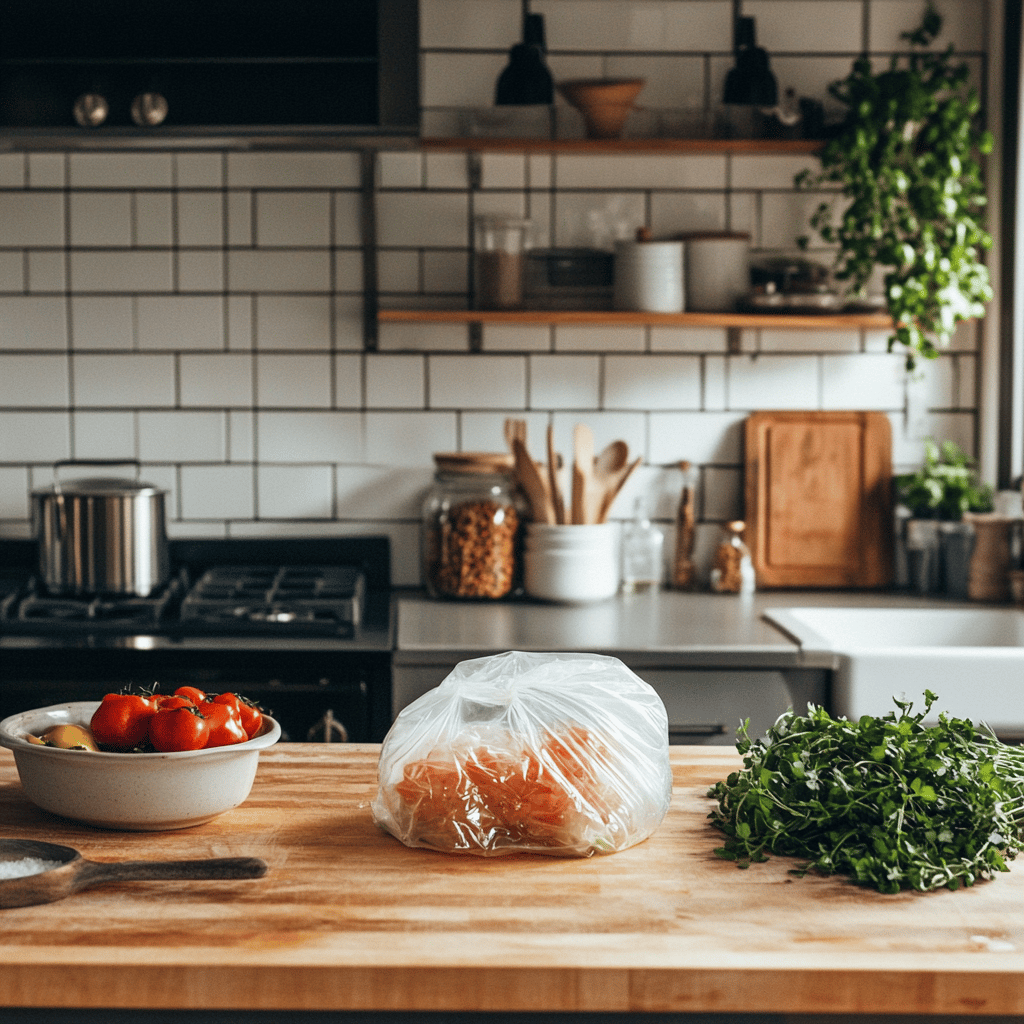The Best Fluffy Pancakes recipe you will fall in love with. Full of tips and tricks to help you make the best pancakes.

Ziploc Finally Settles the Debate: Should You Reuse Plastic Bags?
Discover the vital insights from Ziploc’s recent findings on whether or not it’s a good idea to reuse plastic bags. This comprehensive guide explores the environmental, health-related, and practical dynamics of reusing our beloved, multi-purpose plastic bags.
Introduction
Plastic bags are a common household item, primarily known for their convenience and versatility. Whether it’s a trip to the grocery store or a kitchen storage solution, these bags have cemented their place in our everyday lives. However, the debate over whether we should reuse plastic bags has been ongoing, spurred on by environmental concerns and the rise of sustainability practices.
Recently, Ziploc has joined the conversation, bringing new insights to this often controversial topic. Many enjoy the practicality of reusing plastic bags, while others worry about hygiene and safety. This blog post will provide a thorough examination of the debate, the pros and cons of reusing plastic bags, insights directly from Ziploc, and alternative solutions that can help you make a more informed decision.
The Plastic Bag Dilemma
The issue of plastic bag reuse isn’t just a question of convenience; it delves into environmental, health, and practical considerations. Here’s an overview of why this topic has garnered so much attention:
Environmental Impact
– **Plastic Pollution:** A staggering number of plastic bags end up in oceans and landfills. The impact on marine life and ecosystems is catastrophic, posing a danger to wildlife.
– **Sustainability Trends:** There is a growing movement toward sustainable alternatives to single-use plastics. Reusing plastic bags can be seen as a small step toward reducing overall plastic waste.
Health Considerations
– **Contamination Risks:** People often worry about bacteria, mold, and allergens that can accumulate in reused plastic bags, especially if food was stored in them.
– **Chemical Leaching:** Concerns exist over chemicals that can leach from plastics into food when reused, especially if the bags are old or damaged.
Ziploc’s Standpoint
As a leading brand in the wrap and storage category, Ziploc has long been associated with quality and convenience. Their recent findings help elucidate the issues surrounding plastic bag reuse:
Health and Safety Information
Ziploc’s official guidelines highlight crucial points regarding the reuse of their bags:
– **Use with Caution**: Ziploc emphasizes that their bags are designed for single use to ensure hygiene and maintain food safety.
– **Washing and Disinfection**: If you choose to reuse, Ziploc suggests washing the bags with warm soapy water and allowing them to completely air-dry before reusing.
Environmental Responsibility
Ziploc has caught up with the sustainability trend by creating bags from recycled materials and providing tips on how to recycle their products:
– **Recycling Initiatives**: Ziploc encourages customers to recycle used bags properly rather than tossing them in with regular trash.
– **Sustainable Options**: The company has developed eco-friendly products that reduce plastic waste, demonstrating its commitment to the environment.
Benefits of Reusing Plastic Bags
Despite the caveats, there are several reasons why reusing plastic bags can be a sustainable option:
Cost-Effective
– **Save Money**: Reusing bags can reduce the need to buy new ones constantly, leading to substantial savings over time.
Practical Uses
Plastic bags can be repurposed for various household tasks, including:
– **Trash Liners**: Perfect for small bins in the bathroom or office.
– **Pet Waste Bags**: Handy for dog owners when venturing outdoors.
– **Craft Projects**: Use them in arts and crafts for creative projects with kids.
Convenient Storage Solutions
In the kitchen, plastic bags can offer practical storage options:
– **Freezing**: Great for items like leftovers or prepped meal ingredients.
– **Marinating**: An easy way to marinate proteins and vegetables without stirring.
– **Organizing**: Use them to store will-anything from batteries to seasonal decorations.
Best Practices for Reusing Plastic Bags
If you decide to reuse your plastic bags, consider the following tips to do so safely:
Ensure Cleanliness
– **Wash After Use**: Clean bags thoroughly with soap and water after storing food items.
– **Dry Completely**: Avoid potential bacterial growth by allowing bags to dry after washing.
Limit Reuse for Certain Items
– **Non-Food Uses**: Reserve older bags for non-food uses once they have been used for food storage.
– **Regularly Inspect**: Check bags for wear and tear. If they begin to develop holes or cracks, it’s time to recycle them.
Utilize Compostable and Reusable Alternatives
Consider investing in sustainable options such as:
– **Cloth or Canvas Bags**: Durable, washable, and great for grocery shopping.
– **Biodegradable Bags**: A more environmentally friendly choice for single-use situations.
Frequently Asked Questions
As the discussion around plastic bag reuse continues, many people have questions. Here are common inquiries and thoughtful answers.
Can I safely reuse Ziploc bags for food storage?
While Ziploc bags are designed for food storage, they are not meant to be reused frequently. Ensure cleanliness, and if you do choose to reuse, wash and dry them thoroughly.
What signs indicate a plastic bag should not be reused?
Look for:
– Tears or holes
– Stains or discoloration
– Odors that may indicate contamination
Are there environmentally-friendly alternatives to plastic bags available?
Yes, options such as biodegradable bags, cloth bags, and paper bags offer solid alternatives that align with sustainability efforts.
Conclusion
The debate over whether to reuse plastic bags is multifaceted, encompassing environmental concerns, health guidelines, and practical conveniences. Following Ziploc’s recommendations can help you make informed choices tailored to your lifestyle. Weighing the pros and cons while embedding sustainable practices into your routine is essential.
Ultimately, reusing plastic bags can offer significant benefits if done cautiously and mindfully. As we strive for a more sustainable future, exploring alternatives can further lessen our environmental impact.
If you enjoyed this discussion and are looking for delicious ways to minimize waste in your kitchen, check out our recipe for [Cheesy Crispy Tater Tots](https://exesrecipes.com/cheesy-crispy-tater-tots/), a fun snack that pairs perfectly with your zero-waste groceries!





